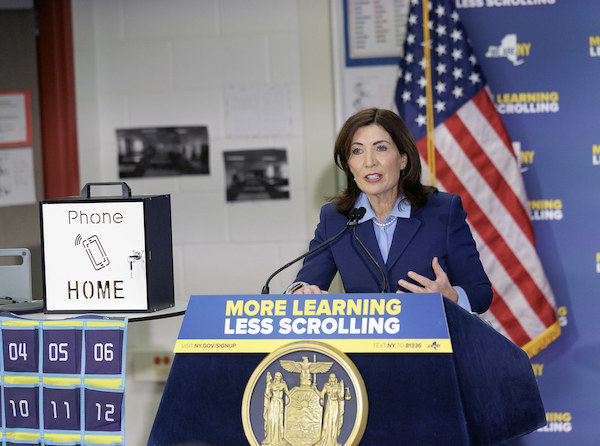
PARK SLOPE — While Gov. Kathy Hochul is advocating a ban on cell phones in public schools, such a move would be nothing new in the Diocese of Brooklyn, where many Catholic schools already forbid students from using the devices.
“We don’t let our students use cell phones at all,” said Carol Timpone, principal of St. Saviour High School in Park Slope. “[They are] not to be seen or used until they are outside of the building.”
St. Saviour requires students to store cell phones in their lockers at the start of the school day — no exceptions — and if a student is caught with one, it is taken away and given to the dean of discipline, she explained. In addition, the student is given detention.
Timpone’s strict policy, which has been in place for more than a decade, is similar to that of other principals.
At Cristo Rey Brooklyn High School in Flatbush, Principal Deanna Philippe gives students a chance to tuck the cell phone away and face no punishment, but only if it’s a first infraction. If it happens a second time, the phone is taken, and the student’s parent or guardian must come to school to retrieve it.
Students usually learn their lesson once mom or dad has to show up at the school, Philippe said. “Once a parent’s been disrupted to come and get it, students are better about putting it in their locker and making sure that we don’t see it from 8 a.m. to 3 p.m.,” she added.
Hochul announced her proposal earlier this year, calling for $13.5 million to be allocated in the state budget to assist schools in implementing bans.
The ban is important, Hochul said in a statement, because cell phones are a hindrance to learning. “From parents and teachers to social justice and law enforcement leaders, New Yorkers agree that our young people succeed when they’re learning and growing, not clicking and scrolling,” she stated.
“Kids shouldn’t have these devices during the school day,” said Chris Scharbach, principal of St. Francis de Sales Catholic Academy in Belle Harbor. “They spend hours on their cell phones when they’re not in school. It’s good to have school be a cell phone-free zone.”
The policy at St. Francis de Sales is to give students a choice between two options when they enter the building — 1) place the cell phone in a secure bin or 2) keep it but turn it off and store it in their bookbag or backpack.
“They’re a distraction,” Timpone said. “If you’re scrolling through Facebook or Instagram, you’re not concentrating on what the teacher is saying.”
Not only that, but cell phones provide opportunities to cheat on exams because with internet access, a student can research the topic, she explained.
According to a 2024 survey by the Pew Research Center, 72% of high school teachers in the U.S. said that students being distracted by cell phones in class is a major problem, with 33% of middle school teachers saying the same.
Julie Scelfo, founder and executive director of the group Mothers Against Media Addiction (MAMA), who supports a statewide cell phone ban in schools, said the phones should be prohibited because the devices harm kids.
“Smartphones distract kids and make it harder for them to focus and learn and also displace critical real-life experiences and interactions that are essential for healthy development,” she noted.
There has been surprisingly little pushback on the ban from parents, according to Philippe, who noted that it has been in effect for two years.
She chuckled when describing how students sometimes unconsciously turn themselves in.
“A student will come to the office saying, ‘My mom wants me to call her.’ And we’ll ask how they knew that,” she explained. “The student then has to admit that their mom texted them and that they saw the text because they were on their phone.”
